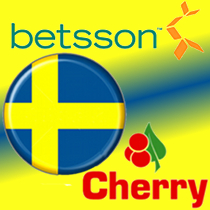 Swedish gaming operator Cherry AB saw profits take a tumble in Q4 2012, falling from SEK 27.1m to 7.5m (US $1.18m). Focusing on the positive, once you strip away adjustments for non-recurring items, earnings actually rose 127%. Cherry’s online gambling division, including the recently launched Maltese-licensed Euroslots.com, saw earnings rise 230% to SEK 6.6m, while Cherry’s restaurant casino earnings were flat at SEK 3.5m. Cherry sold its money-losing maritime gaming division to rival Bell Casino in October in a bid to focus more on its online gaming business.
Swedish gaming operator Cherry AB saw profits take a tumble in Q4 2012, falling from SEK 27.1m to 7.5m (US $1.18m). Focusing on the positive, once you strip away adjustments for non-recurring items, earnings actually rose 127%. Cherry’s online gambling division, including the recently launched Maltese-licensed Euroslots.com, saw earnings rise 230% to SEK 6.6m, while Cherry’s restaurant casino earnings were flat at SEK 3.5m. Cherry sold its money-losing maritime gaming division to rival Bell Casino in October in a bid to focus more on its online gaming business.
Group turnover rose to SEK 177.1m in Q4 from 116.5m. The number of registered customers was up by half to 325,901, but active players fell by a quarter to 30,565. For the full year, net profit after tax came in at SEK 31m (US $4.87m), a decrease from 2011’s SEK 36.7m. Group turnover rose to SEK 473.1m from 368.7m, with online turnover rising 21% and restaurant casino up 7%. Looking forward, Cherry CEO Emil Sunvisson said Euroslots would be rolled out in a number of new markets, and the resulting marketing efforts would likely impact margins in the short term. An increased focus will also be put on setting up a number of regionally adapted gaming sites and a mobile product.
Cherry has also just reached a deal to sell three online gambling sites to fellow Swedes Betsson AB. The deal will see Betsson acquire SverigeAutomaten.com, NorgesAutomaten.com and DanmarksAutomaten.com for SEK 286m ($45m), to be paid primarily via the transfer of 1,063,895 Class-B shares. Betsson already handles operational duties for the sites in question, so the deal will see it acquire the responsibility for external marketing as well. Betsson CEO Magnus Silfverberg said the deal fit well with the company’s B2C strategy in its core Nordic markets. Cherry’s Sunvisson said the divestment represented a “fresh start” for Cherry’s online business.
Sticking with Sweden, the national online operators’ group led by Betsson and Unibet is lobbying the government to consider a 10% tax rate on gross gaming revenue. A report submitted by the Branschforeningen for Onlinspel (BOS) group outlines the effects of three different tax rates – 10%, 15% and 20% — and hopes the government can resist the short-term allure of picking 20%. BOS chairman Silfverberg emphasized that if consumer protection truly was the government’s primary motivation behind the move to a regulated market, then picking a tax rate that actually encourages operators to apply for a license would be good place to start. Sweden is expected to deliver draft online gambling legislation later this year.
